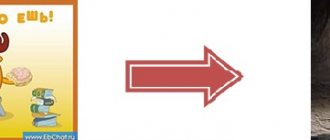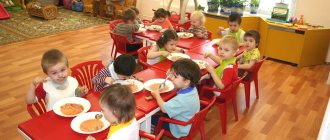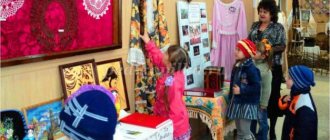Parents' club as one of the forms of effective interaction with families
Dear friends, we are pleased to introduce you to Ginyatullina Fanuza Anisovna, teacher at MBDOU No. 5 “Golden Key” urban settlement. Aktobe Republic of Tatarstan. Today Fanuza Anisovna is happy to share with us useful material about the interaction between preschool educational institutions and families. The article will be of interest to educators seeking to improve and diversify forms of cooperation with parents.
Brief commentary on the article from Fanuz Anisovna:
“The family is the primary source and model for the formation of a child’s interpersonal relationships, and dad and mom are role models. There is no other such institution, except the institution of the family, which so accurately predetermines the patterns of formation of the future person. Parents, not having sufficient knowledge of the age and individual characteristics of the child’s development, sometimes raise the child blindly, intuitively. All this does not bring the desired results. The goal of teachers is to create a unified space for the development of the child in the family and preschool educational institutions, to make parents participants in a full-fledged educational process.”
Useful reading...
Parents' club as one of the forms of effective interaction with families
The family is the primary source and model for the formation of a child’s interpersonal relationships, and dad and mom are role models. There is no other such institution, except the institution of the family, which so accurately predetermines the patterns of formation of the future person. Behind behavioral problems and the characteristics of children's relationships, adults are visible - their views on the world, their positions and behavioral stereotypes. Parents, not having sufficient knowledge of the age and individual characteristics of the child’s development, sometimes raise the child blindly, intuitively. All this does not bring the desired results.
The goal of teachers is to create a unified space for the development of the child in the family and preschool educational institutions, to make parents participants in a full-fledged educational process. Achieving high quality in development, fully satisfying the interests of parents and children, and creating this unified space is possible through systematic interaction between the preschool educational institution and the family.
The role and importance of the family in the upbringing and development of the younger generation is today recognized and indisputable. Our country has a law “On Education”, article 18 of which states: “Parents are the first teachers. They are obliged to lay the foundations for the physical, moral and intellectual development of the child’s personality at an early age.”
Parents share these responsibilities with the child care center where they take their child. The current pedagogical practice convincingly shows that the conscious inclusion of parents in a single process of raising a child, joint with teachers, is the most effective means of proper development of the child.
— How to attract families to participate in the life of the kindergarten?
— How to make sure that both children, teachers, and parents themselves enjoy this process?
— How to learn to listen to your parents and help them become partners and like-minded people?
The author of many books for teachers and parents, Lidiya Vasilyevna Svirskaya, believes that we should start with bringing together the souls and minds of people involved in the child’s life. What could serve as the basis for such a rapprochement? Only the child himself. By talking about the child, what happened to him during the day, what aspects of his personality the child showed, what achievements or difficulties the day brought him - the teacher forms in the parents an understanding that there is an attentive, interested person next to the children who has such information about their child, which the mothers and fathers themselves do not and cannot have. For the simple reason that they are not around. Our joint actions can become the best “bridge” for a child between home and kindergarten.
We must strive to ensure that both children and parents feel comfortable in preschool educational institutions, as well as to ensure that parents are confident in the support of their educational actions.
Involving parents in the joint upbringing of preschool children, I, as an educator and teacher, for several years have been in search of new effective forms of working with families that would make it possible to stimulate interest in the life of children in a preschool institution and to intensify the participation of parents in various events. One of these forms was the organization of a parent club - the “Loving Parents Club”. Interaction with parents allows us to jointly identify, understand and solve problems of upbringing, and also provides the necessary deep connections between raising adults in the context of personal development, which have a positive impact on her physical, mental and social health. Therefore, we consider the creation of a parent club to be the most effective, and in many ways innovative, form of work on interaction with parents.
Thanks to the club form of work, it is possible to create an atmosphere of common interests of the family and the educational organization, provide practical assistance to the family in relieving difficulties in parent-child relationships, form partnerships with the families of students, strengthen the authority of the family and the teacher will contribute to the activation and enrichment of the educational skills of parents, awareness and their full implementation of parental functions aimed at understanding the child’s needs and creating conditions for their reasonable satisfaction.
A parent club is an association of parents created to solve practical problems of education. Usually it is organized by a creative group of teachers and parents. Unlike parent meetings, which are based on an edifying and instructive form of communication, the club builds relationships with families on the principles of voluntariness and personal interest. In such a club, people are united by a common problem and a joint search for optimal forms of helping a child. The topics of the meetings are formulated and requested by parents. Family clubs are dynamic structures. They can merge into one large club or split into smaller ones - it all depends on the theme of the meeting and the plans of the organizers.
Thanks to the club form of work, it is possible to create an atmosphere of common interests of the family and the educational organization, provide practical assistance to the family in relieving difficulties in parent-child relationships, form partnerships with the families of students, strengthen the authority of the family and the teacher will contribute to the activation and enrichment of the educational skills of parents, consciousness and their full implementation of parental functions aimed at understanding the child’s needs and creating conditions for their reasonable satisfaction.
Any form of inclusion of parents in the life of the group should be welcomed. For this it is necessary
• try to inform parents in writing about everything that is happening or will happen in the group and in kindergarten;
• provide weekly and monthly reports on the child's achievements;
• invite to discuss the current situation in the development of the child and make decisions on further joint actions of teachers, specialists and parents who can ensure the successful development of pupils.
There are many ways in which parents can be involved in the daily life of the group. Here are the possible options (to choose from):
• Participation in planning the work of the group. Children are happy to ask questions and suggest project topics that interest them, but teachers do not always have enough of the necessary highly specialized knowledge. Parents' help can be not only useful, but invaluable.
• Participation in the work of clubs or studios. (Parents can even be their leaders.)
• Inviting the children of the group to your work, home or dacha.
• Participation in the work of the family room - helping to advise other parents or distributing books and toys.
• Help replenish kindergarten funds - parents can bring toys and books, magazines and materials that your child and you no longer need.
• Assisting in the preparation of materials for each new project topic - selection of tasks, photocopying of cards.
• Accompanying children on walks outside the kindergarten.
• Repair of group and recreational equipment.
• Work on the parent committee of a group or kindergarten.
• Participation in pedagogical councils.
• Preparation of holidays and participation in them.
It is important to welcome parental involvement in any form and at any reasonable time!
So, a family club is a new promising form of working with parents, taking into account the current needs of families and contributing to the formation of an active life position of participants in the process, strengthening the institution of the family, and transferring experience in raising children.
So, to establish cooperation, first of all, you should reconsider your positions and move from a professional obligation to work with parents to a desire to cooperate for the benefit of the child, and, therefore, abandon the traditional role of a teacher in favor of a partner.
Family and kindergarten are two educational phenomena, each of which provides the child with social experience in its own way. But only in combination with each other do they create optimal conditions for a little person to enter the big world.
Literature:
- Sertakova N. M. Innovative forms of interaction between preschool educational institutions and families: parent meetings and conferences, discussions, workshops, round tables / author-comp. N. M. Sertakova. – Volgograd: Teacher, 2015. – 203s
- Kalinina Yu. V. Innovative technologies of traditional forms and competency-based approach to kindergarten and family work. //Materials of the international. in absentia conf. Chelyabinsk 2011
- Mikhailova - Svirskaya L.V. Working with parents. A manual for preschool teachers. Federal State Educational Standard Series: We work according to the Federal State Educational Standard for preschool education, Education, 2015 - 128 p.
Parents' club as a form of cooperation with parents
Family is the first and main factor in a child’s successful social adaptation. Its involvement in the work of an educational institution, the degree of contact between parents and specialists, the presence of common goals and action algorithms show the quality of educational work in kindergarten, the effectiveness of planned activities, and the level of psychological comfort in the children's and adult team.
Today the state's attitude towards the family has changed. The family itself has become different. The Law “On Education” states that it is parents who are the first mentors and teachers of their children, and preschool education actively helps the family.
Today it is necessary to talk about family adaptation to a child care institution. If parents “accept” the kindergarten and have a positive attitude towards its employees and way of life, then this is already half the success of the child’s adaptation to the children’s team, the children’s institution as another important aspect of life. Providing psychological and pedagogical support for the family, increasing the competence of parents (legal representatives) in matters of adaptation to changed living conditions, regimes, and contacts is one of the most important tasks of the club.
Modern parents must understand that raising a child largely depends on the family. Unfortunately, the educational function of the modern family is currently not sufficiently implemented. Nowadays, parents pay all their attention to the material side, believing that their main task is to ensure that the child is supported in the family, to create living conditions for him, and education and development are the job of kindergarten and school.
Studies have shown that the overwhelming majority of parents do not pay due attention to family education (65% of parents consider the child’s material well-being their main concern), but at the same time confirmed the increased interest of parents in the educational process of preschool education (up to 80% of respondents expressed a desire to accept active participation in it). 90% of parents agree that family education of a child is important and necessary, but noted their pedagogical incompetence in this area.
After analyzing the interaction between teachers and families, we identified the following problems:
– all events for parents are of a mass nature (parent general and group meetings, conferences, workshops). These forms do not sufficiently meet the needs of parents and teachers to establish mutual cooperation in raising children;
– the circle of parents participating in the educational activities of the kindergarten is limited;
– the use of the pedagogical potential of preschool teachers and specialists is insufficient;
– parental and pedagogical experiences of upbringing do not overlap enough, coverage and exchange of information occurs without proper motivation for joint cooperation.
Finding the most effective ways to involve parents in the life of a kindergarten has become a pressing problem for teachers. Both parents and teachers started talking about creating a community, uniting adults, where issues of raising and educating children would be covered from all sides and worked out in different forms. Moreover, everyone expressed the opinion that meetings in such a community should be permanent, creative, help in raising children, solve emerging problems, and contribute to the emergence of a new “parent-teacher” team.
We conducted a “silent” action - a survey of all participants in the educational process - in order to find out preferences, how best to build mutual cooperation between educators, parents and specialists, what form of work is considered basic and acceptable. Questionnaire leaflets were placed in the hallways and corridors of the kindergarten (cups with colored markers were placed nearby), where adults noted:
– red plus – yes, I agree, it’s great;
—
yellow plus
- you need to think it over carefully;
–
blue plus
– I disagree.
Later, the teachers counted the votes on all the questionnaires and announced a joint decision: a club for parents, children, teachers and specialists was opened on the basis of MBDOU kindergarten of the combined type No. 24 “Golden Fish”. This turned out to be the most effective form in terms of the number of votes. This form of cooperation will provide an opportunity to awaken parents’ interest in the life of their children in pre-school education, to encourage them to participate in joint activities with their children, and to have the opportunity to improve their parenting competencies in practice.
On the same day, a competition was announced for the best name of the club, and prizes awaited the winners. The parents' club was called "Warm Meetings". An active group of parents and teachers began developing the Regulations on the Parents Club
(Annex 1).
Parents Club
– a special form of interaction between participants, involving a mutual exchange of experience and knowledge on the problems of development and upbringing of children, helping to deepen understanding and change some life ideas of the participants.
The basis for organizing interaction between kindergarten and family should be the acceptance of the family as the first and most important actor in raising a child. In this regard, within the framework of the parent club, the initiative group developed a rough work plan for the parent club.
The purpose of the plan was to study the educational needs of parents of preschool children, the experience of their implementation, as well as the development of various forms of socio-pedagogical partnership and psychological assistance.




